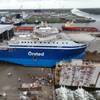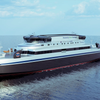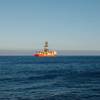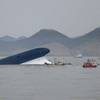Tidewater Regional Transit (TRT), Norfolk, Va., operates mass transit in the Hampton Roads area. It includes three passenger ferries that transport nearly 500,000 people per year across the Elizabeth River between downtown Norfolk and Portsmouth, Va. Like other mass transit providers, TRT receives federal, state and local funds and is encouraged to use alternative fuels to reduce dependence on foreign oil and help improve the environment. But unlike any other transit authority, TRT is successfully operating the world's first passenger ferry powered exclusively by natural gas.
The idea to convert one of TRT's diesel-powered ferries to natural gas resulted from a 1989 meeting with representatives of Virginia Natural Gas to discuss bus fuel conversion. A feasibility study identified potential investors and possible funding sources. As part of the study, TRT's local Cat dealer, Carter Machinery Co., conducted Performance Analysis Review tests and additional analyses on the vessel's two six-cylinder, two-cycle, 180 bhp (135 bkW) diesels. Information collected on fuel consumption and other operating parameters helped establish the attainable benefits of switching to natural gas power. Carter also collected data on Caterpillar's experience with other marine natural gas applications, including a dual-fuel (diesel and natural gas) Canadian car ferry. One benefit of natural gas engines is that they typically have longer life-to-overhaul intervals compared to similarly sized diesels.
TRT determined that converting a ferry to natural gas fuel would lessen its dependence on imported fuel and contribute to a cleaner environment. Recognized as a first for the marine industry, TRT's compressed natural gas (CNG)-fueled ferry required new Coast Guard regulations for CNG fuel. "Safety comes first," says Mark Haushalter, TRT equipment maintenance supervisor, "everything else is secondary."
The Coast Guard agreed with that philosophy and developed installation, monitoring and training requirements for the vessel. Working with TRT and a naval architect from JJH Inc., Portsmouth, Va., installation specifications were established for the storage, transfer and safe use of CNG fuel in the marine environment. New system designs and regulations were also needed for the shore-side CNG fueling facility as well as for the vessel.
Following a bid process, two Cat 3406 SINA (spark-ignited naturally aspirated) engines were selected for the repower. Significant additions included explosion-proof 32-volt alternators with custom mounting brackets, and air-starting motors with non-sparking pinions. The 3406 SINA engines are each rated 215 bhp (161 bkW) at 1,800 rpm. They drive 30 in. x 26 in. (76 x 66 cm) wheels through Twin Disc MG-509 2:1 ratio gears. The repower was completed at Lyon Shipyard Inc. in Norfolk, and the ferry was renamed James C. Echols in honor of TRT's long-time executive director. The replica sternwheeler, built at Freeport Shipbuilding, Freeport, Fla., in 1982, is 60 ft. (18 m) long, with 22.5 ft. (7 m) of beam, and 3.5 ft. (1 m) draft with a full load of 138 passengers.
Because CNG had never before been approved by the U.S. Coast Guard for use on a passenger vessel, the majority of new work on this project focused on fuel safety. New fuel storage, supply, monitoring and alarm systems were developed. Additionally, 20 gas storage cylinders were skid-mounted on the back of the vessel to carry enough fuel for three days' work. The tanks hold 42,000 cu. ft. (1,260 cu. m) of CNG at 3,000 psi (20,700 kPa). Fuel line pressure is stepped down to 125 psi (862 kPa) before entering the engine room, and supplied to the carburetors at a rate of six psi (41 kPa).
Haushalter, who worked on the project from its inception, is proud of the success of James C. Echols. "It isn't easy doing a world's first," he says. "There were plenty of challenges, but we worked through them and we now have a very reliable boat."
Reliable use of alternate fuel proved especially beneficial when the diesel fuel supply ran low for a short period of time last winter: At that time, TRT's first-ever natural gas powered ferry was the only ferry moving passengers across the Elizabeth River.
Sponsored Content
Chris-Marine’s solutions help to prolong engine lifetime

Subscribe for
Maritime Reporter E-News
Maritime Reporter E-News is the maritime industry's largest circulation and most authoritative ENews Service, delivered to your Email five times per week










